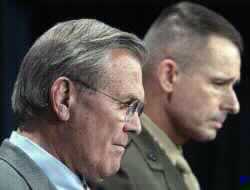US Defense Secretary Donald Rumsfeld said he had ordered regional commanders to sharpen war plans, according to the New York Times, after Washington dismissed as word play a new Iraqi offer to allow UN inspectors unconditional access to its weapons facilities. The newspaper Sunday quoted Rumsfeld as saying he ordered commanders to rewrite war plans to make best use of precision weapons, intelligence and swift deployment.
The US military then "could begin combat operations on less notice and with far fewer troops than thought possible or even wise before the September 11 attacks," it said.
Meanwhile Iraq, warning other Arab nations they could be next if Washington attacked Baghdad, has reiterated its willingness to allow UN weapons inspectors unconditional access to its facilities.
In a letter to chief UN weapons inspector Hans Blix and Mohammad el-Baradei, head of the International Atomic Energy Agency (IAEA), Iraq clarified its agreement on the return of UN inspectors after a near four-year hiatus.
But the letter stopped short of promising inspectors free access to presidential palaces.
"Iraq continues to want to play word games and not comply" with UN resolutions, State Department spokeswoman Jo-Anne Prokopowicz responded in Washington.
In Baghdad, cabinet ministers swore a new oath to President Saddam Hussein, the Iraqi News Agency (INA) reported ahead of a Tuesday referendum to renew his seven-year term of office.
"Vice President Taha Yassin Ramadan expressed to President Saddam Hussein, in the name of the cabinet, the allegiance of the cabinet on the occasion of the great referendum," INA said.
The Iraqi government has been tasked with improving the 99.96 percent vote Saddam won in 1995 as a show of total support against US designs to oust him.
Iraqi Deputy Prime Minister Tareq Aziz warned the United States would target other Arab countries including Saudi Arabia, Syria, Lebanon and Jordan were it first to invade Iraq.
"On Tuesday, the Iraqi people will dish out to the American administration a huge slap," said the influential Babel newspaper.
And it would be "strong enough to bring it to reason and make it understand that intervention in Iraq would be illegal and no cakewalk," the tabloid said.
It accused Washington of seeking to control Iraq's oil reserves -- the second largest in the world behind Saudi Arabia.
OPEC ministers warned Sunday the organization was unlikely to boost crude output at a meeting in December, despite the rising prices.
They also said the OPEC could make up Iraq's quota should it be target of a US-led war, but warned oil prices could increase further on the political instability in the region and cause turbulence on crude markets.
Malaysia's Foreign Minister Syed Hamid Albar urged the 57-nation Organisation of the Islamic Conference (OIC) to call an emergency meeting in a bid to avert a US-led war against Iraq.
Syed Hamid said he feared an attack on Iraq would "arouse anger and feelings of marginalisation among Muslims and even moderate Muslims will eventually be influenced and become extreme because their moderation was not reciprocated."
The five veto-wielding permanent members of the UN Security Council -- Britain, China, France, Russia and the United States -- are engaged in tough talks over the framing of a resolution that would require Iraq to abandon its capability for acquiring nuclear, chemical or biological weapons.
Bush wants a single new UN resolution creating a beefed-up inspections regime with unfettered access and spelling out the consequences for non-compliance.
He has called for weapons inspectors to be held back until such a resolution is formulated.
Supported by Congress, Bush has warned the US would not hesitate to use military action against Iraq, alone or with allies, in the absence of UN Security Council action.
Baghdad denies having weapons of mass destruction, which it agreed to destroy in 1991 after its troops were ousted from Kuwait in the Gulf War.
China's Foreign Minister Tang Jiaxuan Sunday reiterated his country's position that a UN-endorsed political solution should be found to the Iraq issue.
At the same time, Baghdad should obey UN resolutions and allow UN weapons inspectors to return at an early date, Tang said.
Taking advance precautions, Israel began smallpox vaccinations Sunday for several thousand key security and emergency service personnel, as measures should Iraq retaliate against the Jewish state for any US-led action.
The Jewish state also named former overseas intelligence chief Ephraim Halevy as its special coordinator with the United States for Iraqi affairs, public radio reported Sunday.
The former Mossad director, who was already appointed head of the National Security Council in early September, will accompany Prime Minister Ariel Sharon to Washington for talks with President George W. Bush Wednesday.
Meanwhile international experts arrived in Kiev to probe alleged Ukrainian sales of military radar to Iraq.
Kiev has said it is prepared to reveal certain technical details about its Kolchuga radars, as well as naming the countries which have bought the radar systems and intermediary firms.
The US has accused President Leonid Kuchma of authorizing sales of Kolchuga military radar equipment to Iraq in defiance of UN embargoes.
PHOTO CAPTION
Defense Secretary Donald H. Rumsfeld, left, accompanied by Gen. Peter Pace, vice chairman of the Joint Chiefs of Staff, meets reporters at the Pentagon (news - web sites) Monday, Oct. 7, 2002, to discuss Iraq. Rumsfeld repeated Bush administration hopes that Iraqis would overthrow Saddam Hussein (news - web sites) themselves. (AP Photo/Joe Marquette)
- Oct 08 5:18 AM ET
- Author:
& News Agencies - Section:
WORLD HEADLINES


 Home
Home Discover Islam
Discover Islam Quran Recitations
Quran Recitations Lectures
Lectures
 Fatwa
Fatwa Articles
Articles Fiqh
Fiqh E-Books
E-Books Boys & Girls
Boys & Girls  Hajj Rulings
Hajj Rulings Hajj Fatwas
Hajj Fatwas














